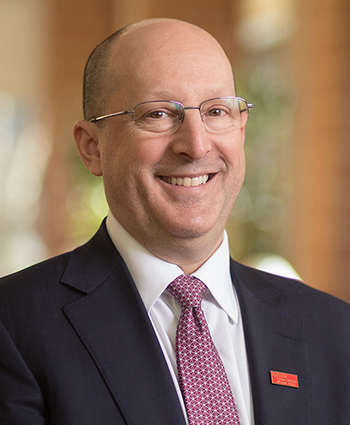New Brunswick, N.J. – Rutgers Cancer Institute, in partnership with Robert Wood Johnson University Hospital (RWJUH) – New Brunswick, is the first in the state to administer a form of targeted cancer treatment known as peptide receptor radionuclide therapy (PRRT) for rare neuroendocrine tumors that have spread beyond the initial tumor site. The first patient received treatment October 24 at RWJUH, an RWJBarnabas Health facility in New Brunswick.
The PRRT treatment lutetium Lu 177 dotatate was approved earlier this year by the United States Food and Drug Administration for adult use and is not widely available across the U.S. at this time. In New Jersey, it is only available at Rutgers Cancer Institute, the state’s only National Cancer Institute-designated Comprehensive Cancer Center, through RWJUH.
PRRT is a nuclear medicine therapy that travels throughout the body looking  for a certain receptor within neuroendocrine tumors. These include pancreatic and small neuroendocrine tumors in the gastrointestinal tract. Once absorbed into the tumor, the radioactive material starts to break down tumor cells, killing them. It is the first radioactive drug approved for the targeted treatment of gastroenteropancreatic neuroendocrine tumors – the type of tumor that took the lives of Aretha Franklin and Steve Jobs.
for a certain receptor within neuroendocrine tumors. These include pancreatic and small neuroendocrine tumors in the gastrointestinal tract. Once absorbed into the tumor, the radioactive material starts to break down tumor cells, killing them. It is the first radioactive drug approved for the targeted treatment of gastroenteropancreatic neuroendocrine tumors – the type of tumor that took the lives of Aretha Franklin and Steve Jobs.
“PRRT works differently than chemotherapy in that it targets a specific receptor in neuroendocrine tumors. For patients with low- or intermediate-grade pancreas or gastrointestinal neuroendocrine tumors, this is the first FDA-approved targeted radiopharmaceutical treatment for this population. It provides those patients whose disease progresses on standard care with an opportunity for improved outcomes,” notes Amanda M. Laird, MD, FACS, chief of endocrine surgery at Rutgers Cancer Institute, who is also an associate professor of surgery at Rutgers Robert Wood Johnson Medical School and is on staff at RWJUH.
In order to administer PRRT, a facility must have nuclear medicine personnel who are specially trained in handling radiopharmaceuticals. The treatment consists of up to four infusion doses delivered eight weeks apart.
 “The ability to offer such a unique form of therapy at Rutgers Cancer Institute and Robert Wood Johnson University Hospital is a testament of our recently solidified partnership with RWJBarnabas Health. Our combined expertise in the management of neuroendocrine tumors enables us to deliver this targeted treatment to the people of New Jersey and the region – treatment that is not available elsewhere in the state,” adds Rutgers Cancer Institute Director Steven K. Libutti, MD, FACS, who is also senior vice president of oncology services for RWJBarnabas Health and an expert in researching and managing the care of patients with endocrine and neuroendocrine tumors.
“The ability to offer such a unique form of therapy at Rutgers Cancer Institute and Robert Wood Johnson University Hospital is a testament of our recently solidified partnership with RWJBarnabas Health. Our combined expertise in the management of neuroendocrine tumors enables us to deliver this targeted treatment to the people of New Jersey and the region – treatment that is not available elsewhere in the state,” adds Rutgers Cancer Institute Director Steven K. Libutti, MD, FACS, who is also senior vice president of oncology services for RWJBarnabas Health and an expert in researching and managing the care of patients with endocrine and neuroendocrine tumors.
Patients with low- or intermediate-grade pancreas or gastrointestinal neuroendocrine tumors for whom standard treatment is no longer working may be a candidate for this targeted treatment. To learn more about the Endocrine and Neuroendocrine Tumor Program at Rutgers Cancer Institute, visit cinj.org/endocrine.
About Rutgers Cancer Institute
As New Jersey’s only National Cancer Institute-designated Comprehensive Cancer Center, Rutgers Cancer Institute, along with its partner RWJBarnabas Health, offers the most advanced cancer treatment options including bone marrow transplantation, proton therapy and CAR-T cell therapy. Along with clinical trials and novel therapeutics such as precision medicine and immunotherapy – many of which are not widely available – patients have access to these cutting-edge therapies at Rutgers Cancer Institute in New Brunswick, Rutgers Cancer Institute at University Hospital in Newark, as well as through RWJBarnabas Health facilities.
Along with world-class treatment, which is often fueled by on-site research conducted in Rutgers Cancer Institute laboratories, patients and their families also can seek cancer preventative services and education resources throughout the Rutgers Cancer Institute and RWJBarnabas Health footprint statewide. To make a tax-deductible gift to support the Cancer Institute, call 848-932-8013 or visit www.cinj.org/giving.
###
For journalists – contact:
Michele Fisher, Media Relations Specialist
732-235-9872
For patient appointments/inquiries – contact:
732-235-8515

